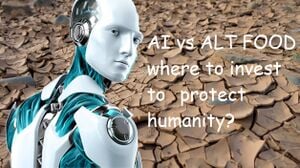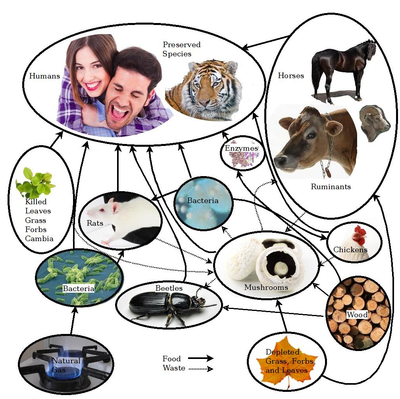
Global agricultural catastrophes, which include nuclear winter and abrupt climate change, could have long-term consequences on humanity such as the collapse and nonrecovery of civilization. Using Monte Carlo (probabilistic) models, we analyze the long-term cost-effectiveness of resilient foods (alternative foods) - roughly those independent of sunlight such as mushrooms. One version of the model populated partly by a survey of global catastrophic risk researchers finds the confidence that resilient foods is more cost effective than artificial general intelligence safety is ∼86% and ∼99% for the 100 millionth dollar spent on resilient foods at the margin now, respectively. Another version of the model based on one of the authors produced ∼95% and ∼99% confidence, respectively. Considering uncertainty represented within our models, our result is robust: reverting the conclusion required simultaneously changing the 3-5 most important parameters to the pessimistic ends. However, as predicting the long-run trajectory of human civilization is extremely difficult, and model and theory uncertainties are very large, this significantly reduces our overall confidence. Because the agricultural catastrophes could happen immediately and because existing expertise relevant to resilient foods could be co-opted by charitable giving, it is likely optimal to spend most of the money for resilient foods in the next few years. Both cause areas generally save expected current lives inexpensively and should attract greater investment.
Highlights[edit | edit source]
- Global agricultural catastrophes and artificial general intelligence (AGI) pose significant existential risks.
- Resilient foods (e.g. biomass to sugar) as a solution to global agricultural catastrophes is highly neglected.
- Considering parameter uncertainty, models indicate ∼99% confidence that further funding for alternative foods is more cost-effective than marginal AGI safety.
- The conclusion of resilient foods being a significant part of the existential risk reduction portfolio is robust with respect to uncertainty within the model.
- More funding for alternative foods and AGI safety is justified only considering the present generation.
Response[edit | edit source]
- Authors' response to Unjournal evaluations of "Long term cost-effectiveness of resilient foods for global catastrophes compared to artificial general intelligence" [1]
See also[edit | edit source]

- Feeding Everyone No Matter What - The full book main page
- David Denkenberger and Joshua Pearce, Feeding Everyone No Matter What: Managing Food Security After Global Catastrophe , 1st Edition, Academic Press, 2015
- Free Preview: Google books
- Cover on Academia
- Facebook page
- Alternative Foods as a Solution to Global Food Supply Catastrophes
- Resilience to global food supply catastrophes
- Feeding Everyone if the Sun is Obscured and Industry is Disabled
- Cost-Effectiveness of Interventions for Alternate Food to Address Agricultural Catastrophes Globally
- Feeding Everyone: Solving the Food Crisis in Event of Global Catastrophes that Kill Crops or Obscure the Sun
- Food without sun: Price and life-saving potential
- Cost-effectiveness of interventions for alternate food in the United States to address agricultural catastrophes
- Micronutrient Availability in Alternative Foods During Agricultural Catastrophes
- Preliminary Automated Determination of Edibility of Alternative Foods: Non-Targeted Screening for Toxins in Red Maple Leaf Concentrate
- Open Source Software Toolchain for Automated Non-Targeted Screening for Toxins in Alternative Foods
- Scaling of greenhouse crop production in low sunlight scenarios
- Potential of microbial protein from hydrogen for preventing mass starvation in catastrophic scenarios
- U.S. Potential of Sustainable Backyard Distributed Animal and Plant Protein Production During & After Pandemics
- Global distribution of forest classes and leaf biomass for use as alternative foods to minimize malnutrition
- Long-term cost-effectiveness of interventions for loss of electricity/industry compared to artificial general intelligence safety
- Long term cost-effectiveness of resilient foods for global catastrophes compared to artificial general intelligence safety
- Rapid repurposing of pulp and paper mills, biorefineries, and breweries for lignocellulosic sugar production in global food catastrophes
- Nutrition in Abrupt Sunlight Reduction Scenarios: Envisioning Feasible Balanced Diets on Resilient Foods
- Methane Single Cell Protein: securing protein supply during global food catastrophes
- Killing two birds with one stone: chemical and biological upcycling of polyethylene terephthalate plastics into food
- How Easy is it to Feed Everyone? Economic Alternatives to Eliminate Human Nutrition Deficits
- Quantifying Alternative Food Potential of Agricultural Residue in Rural Communities of Sub-Saharan Africa
- Yield and Toxin Analysis of Leaf Protein Concentrate from Common North American Coniferous Trees
- Toxic Analysis of Leaf Protein Concentrate Regarding Common Agricultural Residues
- Towards Sustainable Protein Sources: The Thermal and Rheological Properties of Alternative Proteins
Additional Information[edit source]
- ALLFED
- Dave Denkenberger Publications
- OSE Wiki "Synfood" (i.e. protein and other dietary components from microbial organisms fed on gas or other hydrocarbons)





